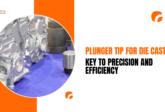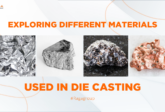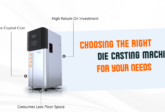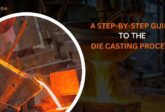Advantages of Aluminum Die Casting in Modern Manufacturing
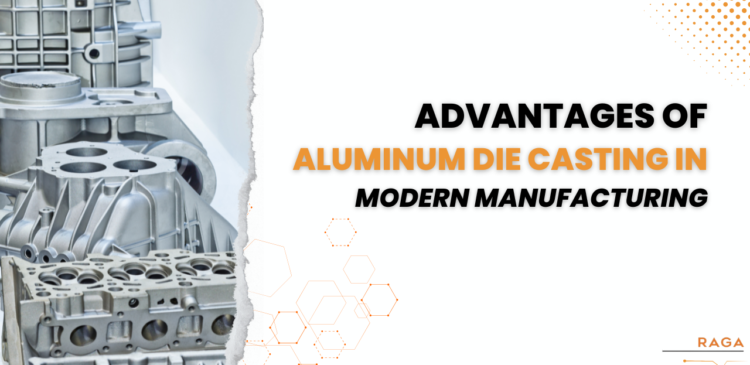
aluminum die casting is a game-changer in modern manufacturing, providing manufacturers with a versatile, durable, and efficient solution for creating complex metal parts. Its lightweight nature, excellent strength-to-weight ratio, and corrosion resistance make it a top choice across industries. This article explores the benefits of aluminium die casting, shedding light on why so many industries rely on this process and how it contributes to cost-effective, high-quality manufacturing.
Understanding Aluminum Die Casting
What is Aluminum Die Casting?
Aluminium die casting is a manufacturing process that involves injecting molten aluminium into a hardened steel mould (die) under high pressure to create precise, complex metal parts. The aluminium quickly cools and solidifies, capturing intricate design details and creating components that require minimal finishing.
How the Die Casting Process Works?
The process begins by heating aluminium until it becomes a molten liquid. This molten metal is then injected into a steel mould cavity at high pressure. Once the aluminium has cooled and hardened, the mould is opened, and the finished part is ejected, ready for use with little or no further processing.
Why Aluminum?
Aluminium possesses several characteristics that make it ideal for die casting. It’s lightweight, yet strong, offering a high strength-to-weight ratio. It also provides excellent corrosion resistance, which is valuable for parts exposed to environmental stress. Additionally, aluminium’s superior thermal conductivity makes it effective in applications requiring heat dissipation.
Benefits of Aluminum Die Casting
- Lightweight
Aluminum’s low density makes it a preferred material for industries focused on weight reduction, like automotive and aerospace. The lightweight nature of aluminium die-cast parts contributes to better fuel efficiency in vehicles, improved performance in machinery, and enhanced portability in consumer products. - High Strength
Aluminium die-cast parts have an impressive strength-to-weight ratio, which makes them suitable for high-stress applications. By choosing aluminium, manufacturers can produce durable components without adding unnecessary weight. This strength also translates to parts that withstand wear and tear over long-term use, making them ideal for heavy-duty applications.
- Corrosion Resistance
Aluminium naturally resists corrosion, thanks to its thin oxide layer that protects it from rusting or degradation. This corrosion resistance enhances the longevity of aluminium die-cast parts, making them especially valuable for outdoor applications or in environments with fluctuating moisture and temperature conditions.
- Thermal Conductivity
One of aluminium’s standout features is its thermal conductivity. This makes aluminium die casting an excellent choice for components that require heat dissipation, such as engine parts, heat sinks, and electronic housings. Efficient heat distribution ensures that products don’t overheat, contributing to better performance and safety. - Cost-Effectiveness
Aluminium die casting is highly cost-effective, largely because of its high production efficiency and recyclability. The process allows for the rapid production of parts, keeping production costs low, especially at scale. Additionally, aluminium scrap can be recycled, reducing material waste and further enhancing cost savings.
Applications of Aluminum Die Casting
Aluminium die casting’s versatility and durability have made it a staple in various industries:
- Automotive Industry: Aluminum die-cast parts like engine components, transmission housings, and heat sinks help to reduce vehicle weight, leading to improved fuel efficiency. The durability and strength of aluminium are essential for high-performance automotive parts.
- Consumer Electronics: In electronics, aluminium die casting is used for housing and heat dissipation components, such as heat sinks. These applications benefit from aluminium’s lightweight, durability, and heat-handling capabilities, which ensure that devices run efficiently without overheating.
- Aerospace Industry: Aerospace manufacturers use aluminium die-cast components for control systems and other critical parts. The lightweight, high-strength characteristics of aluminium are ideal for applications where weight reduction is essential to performance and fuel efficiency.
- Construction: Aluminum die casting produces structural components and lighting fixtures in the construction industry. Aluminum’s resistance to corrosion and weathering makes it ideal for outdoor and load-bearing applications.
- Industrial Machinery: In industrial settings, aluminium die casting is used to create durable parts for pumps, valves, compressors, and other heavy-duty equipment. These components benefit from aluminium’s strength and ability to withstand high temperatures and demanding conditions.
Conclusion
Aluminium die casting offers numerous advantages in modern manufacturing. Its lightweight properties, high strength, corrosion resistance, excellent thermal conductivity, and cost-effectiveness make it ideal for producing parts across various industries. By choosing aluminium die casting, manufacturers can ensure that their products meet high standards of quality and performance while benefiting from an efficient, sustainable, and versatile manufacturing process.
FAQs
Q: What is aluminium die casting?
A: Aluminium die casting is a manufacturing process where molten aluminium is injected into a steel mould (die) to create complex metal parts with high precision.
Q: Why is aluminium preferred for die casting?
A: Aluminium is preferred for its lightweight, high strength, corrosion resistance, and cost-effectiveness, making it suitable for diverse applications.
Q: What are the main benefits of aluminium die casting?
A: Benefits include lightweight parts, excellent strength-to-weight ratio, corrosion resistance, superior thermal conductivity, and cost savings.
Q: In which industries is aluminium die casting commonly used?
A: Aluminium die casting is commonly used in the automotive, consumer electronics, aerospace, construction, and industrial machinery industries.
Q: How does aluminium die casting contribute to cost savings?
A: Aluminium die casting is cost-effective due to high production efficiency, recyclability, and reduced material wastage, making it an economical choice for manufacturers.

